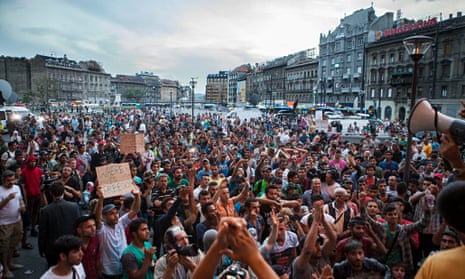When you cut through the horror and the hypocrisy, the exodus across the Balkans is not just a refugee crisis. This is the first, mass trans-regional flight of modern times.
The Middle East has exploded across our TV screens for decades, but now it suddenly feels like an adjacent conflict zone. Just as we realised, in the 1990s, that the Bosnian killing fields were just a commuter flight away, today we are confronted by a clear land and ferry route from the war zone on the Euphrates to refugee centres on the Danube and the Rhine. The resulting crisis may prove too big for Europe to handle. Yes, there have been feelgood moments for anti-racists: as when thousands of German football fans raised banners welcoming the refugees. And Angela Merkel’s decision to process all Syrian asylum applications swept aside complacency. But as it unfolds, this crisis will place a severe strain on the EU’s institutions, and even concepts, for handling migration.
The Dublin III regulation, which requires all asylum seekers to be fingerprinted and sent back to their first country of arrival in the EU, is effectively suspended. The Schengen agreement, which allows passport-free movement across central and western Europe, is falling apart: countries surrounding both Hungary and Italy have attempted to place ad hoc controls on migrants and refugees. Frontex, the agency that for years coordinated a policy of deterrence and prevention – through sea patrols and border fences – looks powerless.
And even as the news organisations agonise over the terminology – migrant or refugee – the distinctions on the ground are becoming pointless. Some migrants trapped in Greece for months or years, not from Syria and already denied asylum, have joined the trudge through the Balkans: they would rather take their chances in the German asylum system than in the Greek one, especially if the right returns to power in Athens this month. If you go to Victoria Square in Athens, where migrants cluster to seek out traffickers, you will meet people from other conflicts, people we’ve not been so hospitable to: Kurds, Afghans, oppressed minorities from Central Asia or Iran, people from Darfur and Eritrea. They are, by definition, asylum seekers – but the EU’s asylum system has already rejected most of them.
When I interviewed migrants in Morocco in 2013 preparing to make the sea crossing to Spain they were clustered into makeshift homes together, regardless of status: the political dissident from Gambia, the bricklayers from drought-hit Niger, the women fleeing poverty in west Africa who now faced racism and sexual violence in Morocco itself.
The disorder we have allowed to assemble at the borders of Europe does not easily divide into “economics” and “war”. The conceit that we can segment those coming here into the “deserving and undeserving” is going to shatter as their claims are processed.
The immediate challenge for Europe is crisis management: the fiasco in Budapest is just the European leadership problem in microcosm. There is no coherence, no predictability and no urgency. As with Greece, and with the prolonged debt crisis of southern Europe, the institutions move sluggishly until leaders are forced into making flamboyant gestures, and no solution is ever reached. But, as they struggle to achieve coherence and to show compassion, the EU’s leaders are accumulating much bigger risks.
An EU into which half a million people can arrive to claim asylum in six months will struggle to justify the same rules and institutions as the Europe that believed its borders were under control. With Dublin III a dead letter, there will have to be a new asylum system based on reality. People will attempt to claim asylum whether they’re victims of war, drought or poverty. Either they’ll be processed in the place they want to settle, or there will have to be mass deportations back to Greece and Hungary – the two countries with the biggest fascist movements in the EU.
And if hundreds of thousands of asylum seekers are given leave to remain in a continent where there is stagnation and mass unemployment, what happens to free movement? The home secretary, Theresa May, has already called for it to be constrained in response to the new situation.
The EU’s leaders can muddle along with broken institutions, flouted laws, flailing border police. Or they can think it through. The OECD’s central projection is that, to stand a chance of avoiding stagnation, the EU’s workforce will have to add 50 million more people through migration by 2060 (a similar number is needed in the US). The Paris-based thinktank says if that doesn’t happen, it is a “significant downside risk” to growth. What this means should be spelled out, because no politician has bothered to do so: to avoid economic stagnation in the long term, Europe needs migrants.
Consent for inward economic migration is fragile and falling – as evidenced by the sudden rush by politicians and tabloids to reclassify the Syrian exodus as a special case. Even if populist resistance to migration stops short of fascism, and even if anti-migration parties are disempowered by the electoral system, their existence highlights a failing consensus. And that is, in turn, founded on economic failure. The Eurozone has produced an arc of stagnation and discontent along its southern border. There is mass unemployment in the very countries that have become the first port of call for migrants and refugees.
So the challenge for Europe is clear. To absorb the refugees we are going to need a new set of rules about where they’re processed; new arrangements for internal travel in Europe. Plus a new social consensus about who can come, who can’t and where they are going to live and work. And, ultimately, a massive economic stimulus.
If the EU cannot do all this, its constituent nations will begin to do so separately. And so, in the space of a summer, the refugee crisis crashes into the Euro crisis, and the one consistent problem is failure of leadership, anticipation and vision.
Paul Mason is economics editor of Channel 4 News. @paulmasonnews

